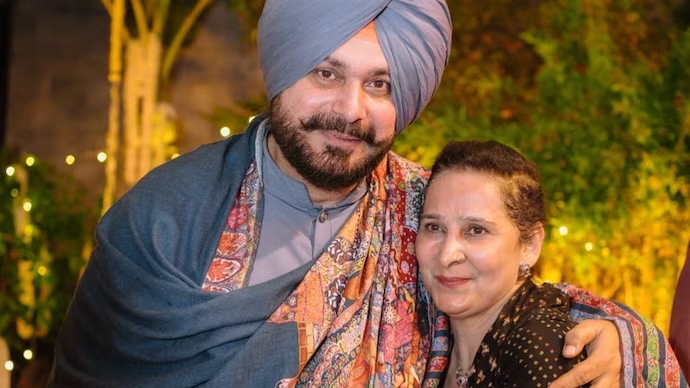Navjot Singh Sidhu’s Wife’s Journey to Overcoming Cancer: A Testament of Strength and Innovation

Cancer is often described as a battle, and for Navjot Kaur Sidhu, the wife of cricketer-turned-politician Navjot Singh Sidhu, this battle was fought on multiple fronts—physical, emotional, and spiritual. Diagnosed with Stage 4 metastatic breast cancer in early 2023, her story is a remarkable journey of resilience, innovation, and the blending of modern medicine with ancient traditions.
The Diagnosis: A Grim Revelation
In January 2023, Navjot Kaur Sidhu, a 60-year-old doctor and former MLA, received the devastating news of her diagnosis. Stage 4 cancer, marked by its aggressive spread, is often deemed incurable. For Navjot and her family, this was a life-altering moment. The diagnosis revealed that the cancer had metastasized, requiring immediate and intensive medical intervention.
Her journey began with a flurry of consultations with oncologists, PET scans, and biopsies to map the extent of the disease. Navjot Kaur opted for an aggressive treatment regimen, which included surgeries, chemotherapy, and targeted therapy to combat the disease at its core. The physical toll of the treatments was immense, and she faced common side effects such as fatigue, nausea, and hair loss. Yet, she remained determined to fight.
Turning to Ayurveda: A Holistic Approach
While undergoing allopathic treatments, Navjot Kaur began exploring complementary therapies. Her attention was drawn to Ayurveda, India’s ancient system of medicine, and the Nobel Prize-winning research of Dr. Yoshinori Ohsumi on autophagy. Autophagy, a natural process where the body cleans out damaged cells, offered hope for healing beyond conventional methods.
Navjot Singh Sidhu and his wife collaborated with dieticians, oncologists, and Ayurveda practitioners to develop a diet and lifestyle plan that would support her treatments and promote overall well-being. The focus was on enhancing her body’s natural ability to heal, reducing inflammation, and boosting immunity.
The Role of Family and Positivity
Throughout this grueling journey, family support became a cornerstone of Navjot Kaur’s recovery. Navjot Singh Sidhu took an active role in her care, ensuring she followed the dietary regimen and accompanying her to treatments. Friends and family rallied around her, providing emotional support that fortified her will to fight.
Navjot Kaur herself remained a beacon of positivity. She embraced yoga and meditation to maintain her mental health, finding solace in spiritual practices and affirmations. "Healing is not just about curing the body," she often said, "it’s about nurturing the mind and soul."
The Milestone of Recovery
By mid-2024, her perseverance began to bear fruit. Regular PET scans revealed a dramatic reduction in cancerous lesions, and by late 2024, her oncologists declared her cancer-free. Her recovery was described as nothing short of miraculous—a testament to the power of combining medical innovation with traditional wisdom.
Navjot Kaur credits her recovery to her holistic approach, which included strict adherence to her Ayurvedic-inspired diet, rigorous medical treatments, and an unyielding positive mindset. "The body has an incredible ability to heal when given the right tools," she said in an interview.
Navjot Singh Sidhu’s Perspective
Navjot Singh Sidhu has been vocal about his wife’s journey, sharing her story to inspire others facing similar challenges. "Cancer is a formidable enemy, but with faith, determination, and the right guidance, it can be defeated," he said. He emphasized the importance of early detection, regular screenings, and a proactive approach to health.
The Ayurvedic Diet Plan: A Lifeline in Recovery
At the heart of Navjot Kaur’s journey was her disciplined adherence to a diet plan rooted in Ayurvedic principles and modern science. Below are the detailed dietary and lifestyle changes she adopted:
The Diet Plan
Diet and Lifestyle Changes:
- The ideal pH level of your drinking water should be 7 (Alkaline Water) to enhance your recovery.
- Consumption of a concoction comprising Cardamom, Holy Basil, Mint, Ginger, and Cinnamon as a replacement for tea.
- Following intermittent fasting by giving at least 12 to 17 hours of gap between dinner and breakfast, with dinner taken before sunset. The first meal of the next day should be at 10:00 AM (an ancient practice in India).
- Beginning the morning with warm water, lemon juice, and a spoon of apple cider vinegar with two pieces of raw garlic on alternate days, followed by consuming an inch piece of raw turmeric/powdered turmeric and 9 to 10 neem leaves (a concoction can also be made and consumed).
- Consuming fruits such as blueberries, blackberries, strawberries, or pomegranate along with carrot, beetroot, and amla juice. Add one spoon of mixed seeds (pumpkin seeds, white sesame, sunflower seeds, flax seeds, or chia seeds).
- Consuming 3 pieces of walnuts, 2 pieces of Brazil nuts or almonds (all nuts must be soaked overnight), with makhanas (foxnuts sprinkled with pink salt) for snacking and coconut malai or avocado as healthy fat.
- Drinking juice of ash-gourd (white petha), oranges, haldi and ginger, cucumber, pineapple with ginger, or bottle gourd (ghiya) in the afternoon or when hungry.
- Consuming a concoction of either soursop leaves (Hanuman Phal) or night jasmine (Harsingar) once a day.
- Eating a salad equivalent to 1% of body weight (e.g., 700 g for a 70 kg person). Salad can contain tomato, spinach, mushroom, carrot, onion, radish, beetroot, cucumber, sweet potato, avocado, broccoli, green beans, and red/green/yellow capsicum. Beetroot or sweet potato should be cooked.
Additional Guidelines:
- Limited consumption of cooked food: 2 cooked vegetables or 1 cooked vegetable with lentils (dals), chana, or rajma, not exceeding 1 serving (katori). All items must be soaked overnight before cooking.
- Take 2 spoons of psyllium husk (Isapgol) with lukewarm water anytime during the day, preferably after the last meal.
- Completely avoid cancer "lifeline" foods: no refined carbs, refined sugar, refined oils, milk products, or packed food containing preservatives.
- Use only cold-pressed oils: coconut oil, mustard oil (kachi ghani), or olive oil. Avoid refined oils.
- Prepare chapati/roti with quinoa flour, almond flour, or water chestnut flour (Singhara Aata). Boiled quinoa is the best replacement for rice as it is anti-cancer and anti-inflammatory.
- Replace milk products with homemade almond milk, coconut milk, or coconut curd.
- Occasionally consume juice of bitter gourd with orange or grapefruit (chakotra).
- Regularly consume 50–70 grams of leaves such as spinach, neem, curry leaves, lettuce, coriander, mint leaves, radish leaves, beetroot leaves, or any salad greens (known as "green blood").
- No aerated drinks and replace white salt with pink salt.
- Exercise regularly in any form, such as walking or yoga, to release healing enzymes and uplift the body.
- Maintain a positive mindset with motivation and support from family and friends, fostering unshakable willpower.
- Wash all fruits and vegetables with baking soda and water containing a pinch of salt to remove pesticides.
- For a sweet tooth, dates can be consumed occasionally but should be free of sugar coatings as they have a low glycemic index.
Lessons from the Journey
Navjot Kaur Sidhu’s story is a powerful reminder of the human spirit’s capacity to overcome adversity. It underscores the importance of integrating medical science with holistic approaches to health. Her journey also highlights the value of family support, positivity, and a disciplined lifestyle in navigating life’s toughest challenges.
For those battling cancer, Navjot Kaur’s experience offers a blueprint for hope and recovery. Her success is not just a personal triumph but a source of inspiration for countless others facing similar battles.





![From Kathmandu to the World: How Excel Students Are Winning Big [Admission Open]](https://nepalaaja.com/index.php/img/70194/medium/excel-college-info-eng-nep-2342.jpg)


